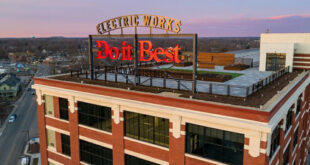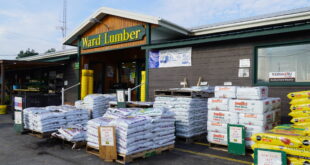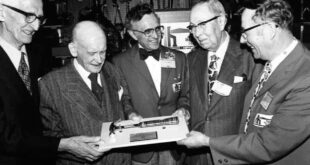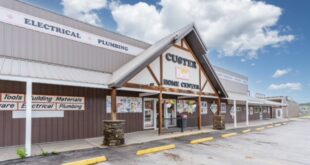To view a PDF of this story, click here.
It’s a brave new world for independent home improvement retailers today. Retailing is changing, and welcoming the challenge head-on is a new breed of independents embracing a bright future for our channel.
For the past decade, the North American Retail Hardware Association (NRHA), Hardware Retailing magazine and the National Hardware Show® have honored the industry’s leaders in the Top Guns program. This year, there’s a new spin as we feature four next-generation independents who continue to grow the legacy of their family businesses.
“This year, we are recognizing these Young Guns to give the industry some insights into their thoughts and dreams, and to demonstrate the vitality of the next generation of progressive independent home improvement retailers,” says Scott Wright, executive director of NRHA’s Retail Leadership Institute.
The Young Guns will gather at the 2017 National Hardware Show for a panel discussion that will take place at 1 p.m. Wednesday, May 10, on the NRHA Village Stage. The 2017 Young Guns include:
Scott Jerousek, Farm & Home Hardware
Since purchasing the business in 2007, Scott has grown sales from $3.8 million in 2007 to $5.2 million by driving sales and customer counts in the store’s lawn and garden and outdoor power equipment departments. He is looking at expansion opportunities in the region.
Jonathan Miller, Miller Hardware
Jonathan represents the fourth generation of his family’s business, spearheading the online ordering and purchasing at all three locations. He’s currently working through the succession
of the business with his father and older brother.
Diana Brunjes Newton, Bay Hardware
Diana made a career change in 2008, returning to the independent home improvement business. Instead of joining the family business outside Chicago, her father purchased a hardware store in Seal Beach, California, and bought a second location nearby in 2013. Diana is currently spearheading a remodel of the original location.
Matt Woods, Woods Hardware
Late last year, Matt moved the family’s existing 1,500-square-foot hardware store and locksmith business to an 8,000-square-foot location a block away. During this time, he also acquired an existing four-store hardware operation and Internet business.
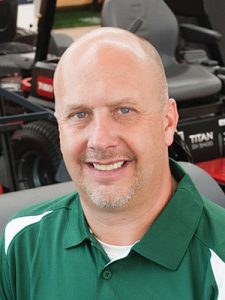 Scott Jerousek
Scott Jerousek
Farm & Home Hardware
Wellington, Ohio
Hardware Retailing (HR): Can you give us a little background on your company and how you got involved in the business? Was this your first career choice?
Scott Jerousek (SJ): You could say being an entrepreneur is in my blood. My grandfather is proof of that. Back in 1960, he believed so much in the idea of Farm & Home Hardware that he put the family farm up as collateral for his first loan. I started earning my keep about the same time I started walking. Back then, for the grueling job of dusting and stocking the shelves, I was paid with sandwiches and all the snacks I could eat.
As the years passed, even though I worked retail to help out the family, I never thought it would be my career path. I thought a degree in finance was the way to go. I was intrigued with big business and the stock market, and the financial world encompassed both of my passions. However, my dreams of a degree from Ohio University were quickly put on hold due to my father’s dwindling health. I returned home to help my family and to help the faltering business.
HR: When did you decide this is what you wanted to do?
SJ: As I grew up, I watched my father age much too quickly due to the stress of owning a small business. While trying to build a future for his family, he worked himself to the bone with little compensation. I still cherish our time together. He made me the man I am today. He taught me so much, but I knew that there had to be a better way. I learned to do things smarter, not harder.
We started to implement training programs for our staff, and we realigned our key departments. Those small changes showed positive increases. Then the housing boom started. If you weren’t seeing 10- or 15-percent increases every year, you must have been doing something wrong. Business growth was easy, but there was no way it could sustain at that pace. With a wary eye toward the future, we wondered what effect an economic downturn would have on the business. How do we prepare ourselves for life after the crash? That’s when the analytical side really started to resonate with me, and suddenly retail became so much more interesting. I bought the business in 2008. As predicted, the market could not sustain, and the housing crash and recession started. It was time to put my theories to the test.
HR: You emerged stronger from where you started after buying the business in 2008, growing top-line revenue from $3.8 to $5.3 million during one of the toughest economic times in recent memory. What are some of the growth opportunities you have your eye on for the future?
SJ: I took a hard look at my business. Growth had slowed, and I needed to understand the factors. By utilizing market potential reports, I found that we had done a great job maximizing our current location’s top-end sales. We had nearly doubled the potential predicted by the experts.
I felt our growth opportunity was in acquisitions. By focusing on top-line growth, we were able to start extending our brand and business model to adjoining communities. This also created operating efficiencies that would help to increase profitability for the business.
We are again looking at market potential reports to find more of these opportunities. Then we will analyze their business situation and project our model into their location. By looking at the growth opportunities and risks associated with each business, we can then calculate a ROI for that location. This process was made significantly easier by the relationship I have established through NRHA with the good folks at Aubuchon Hardware. Marcus [Moran, Jr.] and Josiah [Gates] have been instrumental in helping me establish evaluation metrics for the acquisition process. I would again like to thank them for their time and professionalism.
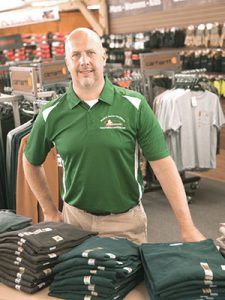
HR: What unique challenges do you think independent retailers face in today’s market?
SJ: We want to continue to cultivate our relationships with our current customers while also preparing to fulfill the needs of our next generation of consumers. We identify want they want, and we make it happen.
Online retailing is here to stay, but people still crave personal interaction. Interpersonal communication is a must in our business. Even with our 360-degree marketing plan, we make it personal, and we make it relevant. We utilize print advertising and some direct marketing through our customer rewards program. On the digital side, we utilize our website, email marketing, social media and Google AdWords to promote the Farm & Home Hardware brand. Thanks to Independent We Stand, Small Business Saturday by American Express and other organizations, being a small business is cool again.
HR: So acquisitions will play a major role in your future growth?
SJ: Acquisitions are definitely an opportunity for our future, and we are working every day to find the right fit, but both parties must get a fair deal in order for that to work. I want to be able to look the owners in the eye, shake their hands, and tell them that they have done a great job building their business. I want them to know we are only adding our story on to their legacy.
There are plenty of great hardware people in the business today. Quite a few are ready to retire and hit cruise control instead of investing time or money in growth. Unfortunately, their stores become stagnant and their business starts to decline. Finding these opportunities to work with experienced owners is paramount to our growth in the future. Eventually, I can see
Farm & Home Hardware with five or six locations.
HR: Outside of acquiring new hardware stores, what are some of the other growth opportunities you are pursuing?
SJ: Independent business is demanding in hardware and in all other fields. We have grown significantly by identifying these opportunities. Both independent garden centers and outdoor power dealers deal with the same issues. How do they remain relevant and profitable with increasing big box competition? Business is booming for a portion of the year and dead in others. It’s difficult to deal with these ebbs and flows and still remain profitable.
Our parents had great work ethic. They had no problem working 50 to 60 hours a week to build a business. Their children would like a better return on their investment, and have moved on to build their own careers. With that, there has been a huge change in the retail landscape.
We looked at these opportunities as pillars of our business for the future. We needed departments that could compete with big-box chains. We are able to offer the same uniqueness as other independent stores, but we don’t need to support the entire business with any one pillar. I feel appliances and furniture are great opportunities, too.
Again, customers are looking for a personal experience at a store they can trust. We offer service for everything we sell, so the opportunity for additional transactions is there. With the decline of Sears and other appliance stores, there has been a huge hole that needs to be filled. The big-boxes have seen the benefits of appliances. I feel we can offer people another viable option.
It’s all about the operating efficiencies. We have a current service program in place for our outdoor power department. We deliver, we sell the parts and we can repair your equipment. Adding appliances to the mix should be interesting. I love the challenge.

HR: Can you talk about the value and importance you place in furthering your education and networking with other independent retailers?
SJ: I’m a big believer in networking with other critical thinkers. My first mentor in hardware was a numbers guy who taught me about the analytical side of the business. I still run ideas by him.
Over the last five years, I’ve focused on personal growth and recognized the importance of working on the business. Running the operation from 30,000 feet has helped me develop our staff and programs to prepare us for the future. Dealing with other people in the industry who are the best at what they do is imperative for the continued success of my business. The best way to overcome obstacles is to learn from other retailers. NRHA is championing the cause of independents and facilitating discussion. We are all facing the same issues, and by working together as independent retailers, it’s going to make us, and our industry, stronger.
I believe your customers can love your business only if your staff loves it first. There are many different business models to follow, but the ones that have enduring success are the ones where employees felt valued. Invest in your culture, and it will reflect on your bottom line.
 Jonathan Miller
Jonathan Miller
Miller Hardware
Valdosta, Georgia (Three locations)
Hardware Retailing (HR): Can you give us a little background on your company and how you got involved in the business? Was this your first career choice?
Jonathan Miller (JM): Just as most anyone who grows up within a family business, I worked at the store throughout my middle and high school breaks. As the youngest of four children, I was always chasing the footsteps of my brothers and sister growing up. As I finally reached the ripe age of 18, I knew very little of what was to come, but I could tell you that the hardware store and Valdosta was not going to be part of it.
Leaving town as fast as I could, I set out for Auburn University, where I pursued a bachelor’s degree in finance. I cherish every second I spent in Alabama. The friends I made and network I built is totally invaluable. From Auburn, I moved on to Atlanta, where I pursued my MBA at Mercer University.
As graduation neared, I began looking heavily toward a job involving the financial markets. In an ideal world, I wanted to put in my time as an internal fund wholesaler, working my way to an external position. The lifestyle seemed attractive, the pay substantial, plus it would more than likely keep me within a large city—close to friends and other people similar in age.
At a distinct point in time, between personal quiet time and close friends’ testimonies, I decided to list my true priorities and the best ways to enhance those relationships and reach those goals. The commitment to work for Miller Hardware Company was one of many God-invoked decisions that have impacted my life. It’s part of a path that led me to the most incredible person in the world, my wife, while giving me an opportunity to interact with my family on a daily basis. My father couldn’t have been more encouraging or less pressuring. We do not always agree, but the process of working toward a compromised solution always works in the benefit of the business. I’m blessed beyond belief and owe it all to my family.
HR: You operate three very diverse and different businesses. How did these three businesses come about, and what are some of the challenges in serving such a diverse customer base?
JM: Miller Hardware Company was founded in 1908 and is made up of three distinct divisions: Whitehead Industrial Hardware, which serves the industrial market, primarily MRO and the construction trade; Miller Hardware, which is the founding, downtown core hardware location; and Seasons Garden Center, which is our retail hardware and garden center location.
I believe each division sprung out of an opportunity to diversify. Each business spawned during a separate generation of ownership. The difficulty lies in tailoring a major decision that supports the best interest of each division. For example, we serve the industrial channel, commercial contractor and the garden enthusiast all out of the same ERP (Enterprise Resource Planning) and accounting department. What’s beneficial for one industry may be a hindrance or poor decision for another.
Aside from financial resources, it’s important to disperse your level of attention appropriately. It’s easy to become blinded by sales volume and near-sighted by success. I’m incredibly thankful to have my brother involved, allowing us the flexibility to shift through each area of the business.
HR: What unique challenges do you think independent retailers face in today’s market?
JM: I feel the common answer to this question would be Amazon and the big boxes. However, looking beyond the uncontrollable, the greatest area of concern is bridging the generation gap—not only with customers, but even so with employees.
This concept will bleed into all key areas of a business. It’s critical to step back and realize that the way not only your customer buys, but also the way you should be buying from vendors and probably most importantly, the way your employees buy in to your culture is changing significantly—effective yesterday!
The worst part about it is, there’s no clear formula. Every generation brings to the table certain strengths that you can’t afford to ignore or leave out. Change management is obviously a large piece of the equation; for success, it’s most important to have a non-discriminatory team who sincerely understands the necessary reasons for change.
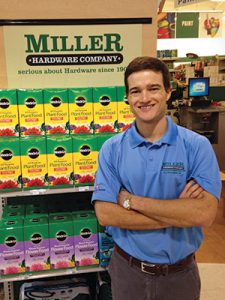 HR: What are some of the key opportunities that you feel independent retailers will have in short term?
HR: What are some of the key opportunities that you feel independent retailers will have in short term?
JM: Drive home the point that you are local, and encourage customers to buy that way. Many Millennials and Gen Y, specifically those with higher discretionary incomes, are attracted to a more premier, intimate shopping experience. This concept is best illustrated in the restaurant industry. The key word here is experience. Find a niche that may be a void in your community.
In 1996, my father built a retail hardware store with a small garden center attached. Twenty years later, we have a garden center with a hardware store attached. People shop our hardware store hoping to fulfill a need or fix a problem, but wander outside and you’ll find folks in search of an experience that involves a consumable product.
HR: Where do you see the business in the next five years?
JM: I would like to see us take a much more progressive stance as an organization. Far too many of our current processes are results of our business’ evolution. Rather than us taking into account current variables, we are still playing outdated strategies in many of our high-impact areas. I’m not saying we are not eager to increase in number of locations, but I do believe there’s far more to it than a financial decision.
I’m a believer that a sustainable, succeeding business must carry a healthy anatomy. Identifying operating inefficiencies is just as critical as an uptick in sales. We don’t have the necessary procedures or road maps built just yet to convince me to consider acquisition. Hopefully in 10 years, we will have positioned ourselves to pursue physical growth. Learning from others’ acquisition models has stirred a motivation in me to pursue non-succeeding family hardware and garden retail centers at some point in my career.
HR: Where do you see the home improvement industry in five years?
JM: I’m a strong believer in the omnichannel concept. If you aren’t currently providing multiple channels for your customer to transact, you are behind the game. A productive ecommerce website is not ‘plug and play’, nor does it come to existence quickly, regardless of your resources. If you choose to pursue selling online, be very aware that there are a prolific amount of people who will gladly take your money in return for a weak jab at developing your site. Integration into your ERP system, mobility and having a key, vested person overseeing the project is vital.
Since establishing our presence online in 2011, we have set aggressive marks for this division of our business. In the future I see BOPIS (‘Buy Online, Pickup In-Store’) affecting all three of our markets. It’s interesting to notice that some retailers are already reserving privileged parking closer to the doors for such transactions.
HR: Can you talk about the overall value and importance you place in furthering your education and networking with other independent retailers?
JM: I believe industry education and networking is an invaluable resource for better understanding our businesses. Human nature is always going to gravitate toward comfort, and most people find comfort in their homes and community. However, the truth is that the industry we operate in does not pulse out of our backyard.
So many aspects of our business vary geographically. Opportunities to learn these differences and identify our weaknesses are readily available. Attending trade shows such as the National Hardware Show, or becoming involved with industry-specific associations, such as NRHA, are great places to start.
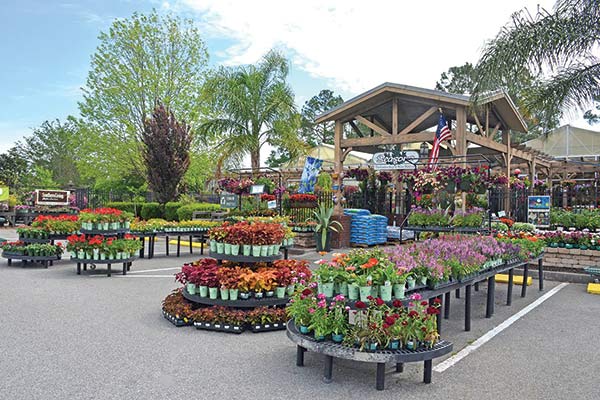
HR: You are currently going through a succession plan with your family. What advice would you give to other families as keys to success in this process?
JM: Start early—as in now. I have an unfailing love and respect for every person in my family. It’s important to realize that each required decision is in consideration of the longevity of the company.
I can only suggest that you apply adequate attention and involve professional consultation that can identify every possible angle. Ultimately, the method you devise must make the most sense for the longevity and valuation of the company.
HR: What advice would you give to someone considering getting started in this industry?
JM: Don’t box yourself in. Thinking back to my late grandmother’s influence to move into a larger market, my grandfather’s ambition to construct a new retail space, my father’s motivation to oversee an acquisition, then eventually extending the company into plant materials—all came as a result of stepping out of the core.
My personal goal is to simply exploit every industry resource I can possibly find and constantly pursue practical opportunities that enable growth.
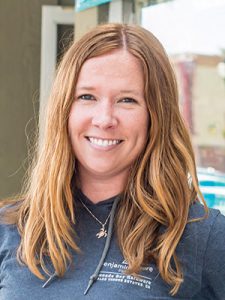 Diana Brunjes Newton
Diana Brunjes Newton
Bay Hardware
Seal Beach, California (Two locations)
Hardware Retailing (HR): Can you give us a little background on your company and how you got involved in the business? Was this your first career choice?
Diana Brunjes Newton (DBN): I grew up working in our family business, Craftwood Lumber & Hardware, in Highland Park, Illinois. But when I went off to college in 2002, I decided to go into education, as I always wanted to be a high school math teacher and teachers were in demand. By the time I graduated in 2006, that market was very saturated, so I ended up working part-time at a tutoring center, and also part-time in the family business. I would work at Craftwood from 6 a.m. until noon. Then I would start tutoring at 2 p.m. and be there until 8 p.m. I received several promotions while at the tutoring center, and was essentially running the place after a couple of years. It was great. I got my fill of education while working with students and teachers, but also got to work in the family business.
Unfortunately the owner of the tutoring center and I butted heads a lot. I didn’t feel appreciated and expressed that to my father. At about the same time, he had been talking to the owner of Bay Hardware in Seal Beach, California. We had to check it out before moving on with any real negotiations. My parents and I came out to California to visit the store for the first time, and I just fell in love.
HR: What was the store like when you purchased it?
DBN: The store was in a tailspin financially, but I could see its potential. It was going to require a lot of work. When we first walked in, we were struck by the size: only 3,000 square feet. A lot of hooks were empty, pricing seemed inconsistent and a couple employees passed us by without a hello. So my parents and I talked about it, and we decided to go for it! For me, this was the best decision I had ever made.
These series of events to follow have changed my whole life. But looking back, I definitely wasn’t as prepared as I thought. Operationally, some procedures in place were inefficient, and the inventory file was a bit of a mess. When I came in, I tried to lead by example, and I brought forth my ideas, work ethic, care, love and appreciation for what I do. If you don’t care about what you do or where you are working, it’s reflected in what your store looks and feels like to your customers.
That was in was 2009. I was 25 years old, and I really had to prove myself to the employees and the customers. I was criticized for any mistake or bad decision I made—which were truly learning lessons, looking back. There were a lot of customers who didn’t want to deal with me back then, who I now see in the store every day and who ask for my help. Seal Beach is very close-knit, and change is hard. But we were becoming more businesslike, and we were doing a lot of things to make the store better, and eventually people started realizing it. These changes were always with the best intent to make things better. There is no doubt that the store would not be here today if we hadn’t made these improvements and changes. Then, in late 2013, we purchased a second store in Palos Verdes Estates, about 20 miles north of Seal Beach.
HR: Like your father, did you feel a need to return to the family business after initially pursuing a very different career path?
DBN: There is just something really cool about this business. It works for my family. My grandmother started at Craftwood, and my mom worked there in high school, which is how my dad got involved. All of us kids grew up there, and I feel it takes a really special kind of person to own and operate an independent hardware store. You have to be kind of weird or very unique. I can’t explain it. You have to know everyone, and everyone has to like you. That’s why they keep coming back.
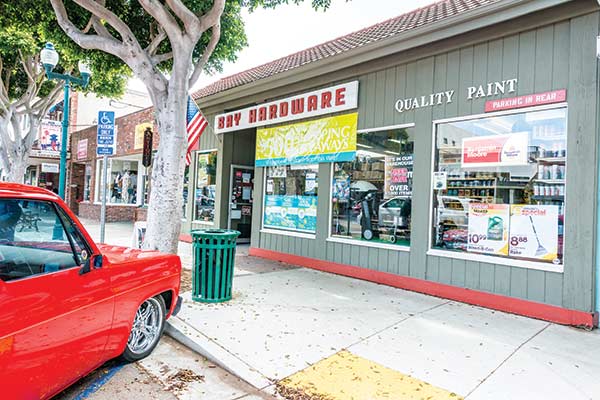
HR: What unique challenges do you think independent retailers face in today’s market?
DBN: I think the biggest one is staying relevant. We need to find ways to make sure people know we’re here and that they continue to shop with us. We also have to do the things people expect us to be doing, such as having a nice website and a social media presence, offering special services, price matching and stocking certain products. There is also the challenge of being the “old school” store everyone remembers from their childhood. That isn’t always a good thing, when customers expect a modern-looking store with good lighting and signage and clean floors. You have to look at it from the customer’s perspective. For independents who have been in the same location for a long time, the hardest thing is opening your eyes and trying to see the store like you are seeing it for the first time.
Another challenge facing independents is that we have a really hard time finding qualified, awesome people. I was reading an article about how difficult it is to find qualified tradesmen, as young people aren’t choosing that career path. I think the same is true for our industry.
A lot of people are moving into service-oriented fields and technology, and it’s going to be tougher finding someone to hang your door or fix your faucet, or finding knowledgeable staff members for hardware stores moving forward. What will that look like in 20 years? I don’t know, but maybe that will be another opportunity.
HR: Where do you see the business in five years?
DBN: I think every beach town could definitely support an independent hardware store of our size. But we’d have to do it right. I would love to open or purchase a number of stores up and down the coast. We’ve had several conversations with owners letting them know we are interested if they are looking to sell. At this point, I’m looking for people who aren’t already committed or towns I feel could support a store.
I’m also interested in opening other related stores nearby, such as a full paint store or a rental store. I want to stay by the coast. While it’s a little more expensive to be here, there’s no chance of a box store coming in within a couple of miles. The space doesn’t exist. In this area, you’re looking at $50 million just for the property.
HR: Where do you see the home improvement industry in the next five years?
DBN: In the near future, I think we will see the strong independent retailers taking over more stores. Every year, I hear a story about an owner passing, and his kids weren’t interested in the business, and they have to sell what was a viable store. Had we not come along, our second store would have probably closed by now. The owner didn’t have a succession plan; he was going to close and liquidate.
I think there will be a lot of opportunities for acquiring good stores in both the short and the long term, and I am certainly keeping my eyes open for this. I’m excited for the future.
We just had our best year ever at both stores. It would make me very happy if I would have 10 stores one day, helping make other people’s lives better, and getting to work with my friends at the same time. It doesn’t get any better than that.
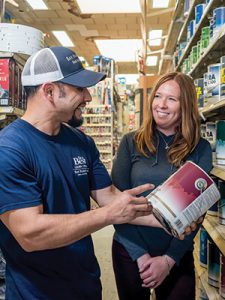 HR: Discuss the overall value you place in furthering your education and networking with other retailers.
HR: Discuss the overall value you place in furthering your education and networking with other retailers.
DBN: I got involved in a networking group for local businesses about a year after I moved out here. I didn’t know anybody, so it seemed like a good idea just to meet people. I joined the chamber of commerce, and eventually was president of the board. I was also secretary for the Lion’s Club.
Being part of these groups was very important because it helped me develop my business acumen, while making friends at the same time. These networking opportunities helped me to meet like-minded individuals.
We get so lost in what we do every day to make things happen and keep things going that we sometimes forget about the bigger picture, especially for those who are managers or owners. You can get lost on the salesfloor and lose sight of the things that can make your business successful.
Going to classes like NRHA’s Retail Management Certification Program and Do it Best’s Leadership Development Institute really reminded me that you can’t run a business from the floor. I love the ideas I gather from them. It’s not always about doing something the same way someone else does it, but being able to make that concept work for you. These types of gatherings really motivate me to try new ideas and make things happen!
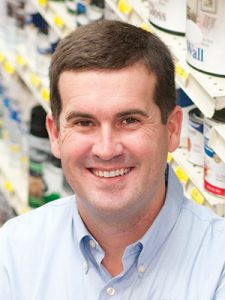 Matt Woods
Matt Woods
Woods Hardware
Cincinnati, Ohio (Six locations)
Hardware Retailing (HR): Can you give us a little background on your company? Was this your first career choice?
Matt Woods (MW): I am fourth generation. My family started a locksmith business in 1933. As a kid, I was always in the store cutting keys, cleaning up brass and being underfoot of my father and grandfather. I actually went to college and majored in marketing and sales and ended up going to Florida, living there for 10 years and taking a job as a financial advisor. That was my first career choice. But after having our first child, my wife and I realized we wanted to be in more of a family working environment where I wasn’t just a number and could control my own destiny.
We were a locksmith and door company up until 2006. But when many of the small, urban hardware stores in downtown Cincinnati were closing, my parents had the foresight to open a convenience hardware store as part of our locksmith business. It made sense because many of our customers were either maintenance or janitorial guys who needed other hardware items. Then several years later it became very popular to move back to the urban corridor, and we started seeing a huge swell of new residents and new businesses popping up as the downtown was growing.
HR: You recently moved your existing 1,500-square-foot store to a larger, 8,000-square-foot location down the street. How did this move come about?
MW: At the time this opportunity presented itself, we were actually thinking of expanding to a 3,000-square-foot store. We started talking to all of our customers, some of whom are property managers, and one of them let us know about a building right around the corner that was 8,000 square feet. They said they would give us the deal of a lifetime, and that they just wanted to do the development work. When I walked in, I was floored by the space, and the rest is history. It was half a block away, and we didn’t know about it.
We purchased that building in November 2015 and wrapped up construction in November 2016. We opened for business in the new store in January of this year.
HR: At the same time, an opportunity to acquire a well-established, four-store hardware operation presented itself.
MW: I’ll never forget it. I was in Indianapolis attending the NRHA Young Retailer Roundtable in the fall of 2015, where one of the topics for discussion was acquisitions. When I
was driving home from that meeting, I got a call from my co-op’s sales rep, who said there was an opportunity to acquire a four-store hardware chain in Cincinnati. It was a chain owned by the Small family, and we felt that the opportunity was a perfect fit for our business plan. At first we only wanted two of the four stores, but as part of the due diligence, we realized that the cash flow of the business was really in the two stores we didn’t initially want to purchase, as well as in their online division. We started peeling away at the onion and realized there was a lot of potential in acquiring all four stores and the online division.
The biggest challenge is that this was our first acquisition, so we didn’t know what to expect as far as timelines, attorney’s fees or understanding how the acquisition process takes place. We thought it would be a six-month process, and it ended up taking almost 12 months to close the deal. That was last October, and we ended up moving our main location down the street in January of this year. Now we are in the process of remodeling each of those four stores. They are all going to have a similar footprint and design, with the same inventory across all stores.
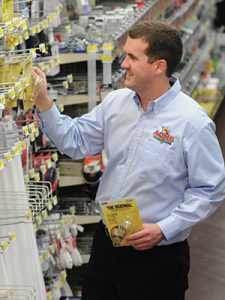 HR: What are some of the key opportunities that you feel independent retailers operating urban locations have today?
HR: What are some of the key opportunities that you feel independent retailers operating urban locations have today?
MW: We are seeing more millennials and empty nesters starting to move back downtown. Property might be a little more expensive in the city,
but when you are going from a 4,000-square-foot home to an 1,800-square-foot home, it actually nets about the same. People want to be back in a community where you can walk to the local café. So you are seeing higher density, and it’s challenging for the competition to come in, due to higher costs. It’s not like a big box is going to come in a wipe out an entire city block to build a store.
We really want to continue to focus on adding urban locations; however, we won’t pass up an opportunity for a good suburban store. We just feel like people moving into urban areas is a trend that will continue. We’re keeping our eyes out for finding the right location and the right people to run it. But with all we have been through recently, we’re focused on these six locations right now. I haven’t boxed myself in on how many stores we’ll have one day. Over the next two years I want to continue to refine the model and the SOPs (standard operating procedures) and then continue to grow from there.
HR: So growing through acquisition is part of the plan moving forward?
MW: I heard a statistic that 45 percent of the attrition that independent hardware retailers are experiencing is due to lack of succession planning. We feel this will create acquisition opportunities moving forward. As long as interest rates remain low and credit is available, there will be more acquisitions in our future.
But it’s not easy. It seems like there would have been more people interested in the acquisition we just went through. But very few wanted to take on the entire company at the same time, and the owners didn’t want to piecemeal the deal. It was also uncertain if the former owners would get a buyer, and they were starting to slip into retirement mode. They had hit that fine line where they were trying to sell the business but hadn’t been reinvesting in it for several years.
If interest rates remain low, and if you can get capitalized well enough, I have a strong feeling you will see more mid-size chains growing their presence across the country.
HR: Can you discuss the importance of having a succession plan?
MW: As part of our family’s succession planning process, we have developed a trust. My parents are in their 50s, so they still have quite a few working years left. Because of our future growth plans, we worked with some really smart advisors and put together a trust and a financing plan that made sense for all involved parties.
I also have three siblings who don’t work in the business, so we had to address that as part of the succession planning as well. You always hate talking about the death of your parents, but it was really important to have a sit-down and address all of these issues to make sure what my parents were planning was fair for everyone and that the business can continue succeeding well past their days.
There were definitely some uncomfortable moments between me and my parents during this process, and I recognize that all of the growth we have been doing has been off of their foundational work. So it becomes a reciprocation of respecting their leadership and what they have accomplished. At the same time, they have really entrusted me and have given me a lot of leeway to try to grow this thing.
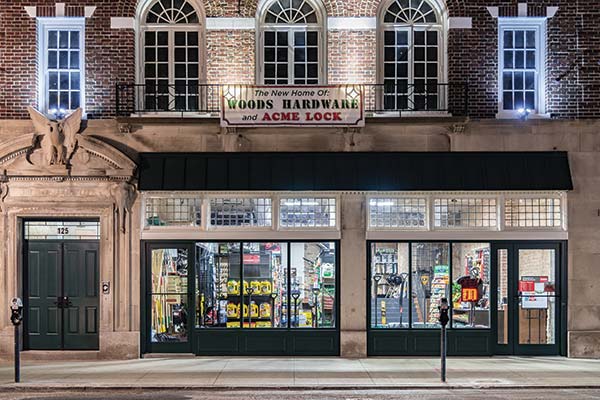
HR: What unique challenges do you think independent retailers will face in the next five or 10 years?
MW: Some of the challenges we face involve regulatory uncertainty. We like certainty, so whether the Affordable Care Act continues or the tax rates change or stay the same, it’s hard to grow when you don’t know what the future holds. My parents and I set up this trust based on the currently regulatory environment. Now there are huge changes taking place, so it throws some of our planning into limbo, and we’re asking ourselves, “Should we expand now, or should we expand later?”
HR: What is the value in furthering your education and networking with other independent retailers?
MW: When I was in school for my MBA and being honored as an NRHA Young Retailer of the Year, every time I met someone who had “been there, done that,” I found myself learning some really great best practices and some great tips that we were able to incorporate into our business that have made a big impact.
It’s really about the people you surround yourself with and the guidance they provide. If I could say anything to anyone who’s reading this article regarding future growth, it’s this: Get two or three very wise people with lots of business experience to help guide you. You don’t want to surround yourself with “yes” people, but rather with people who are going to tell you the truth. I’ve been fortunate enough to have three business development coaches who have all given me tremendous insight.
 Hardware Retailing The Industry's Source for Insights and Information
Hardware Retailing The Industry's Source for Insights and Information




